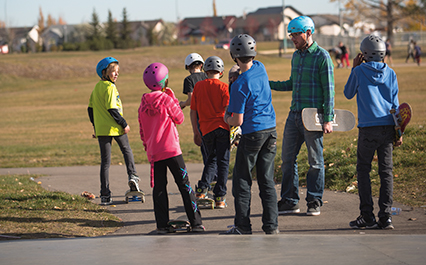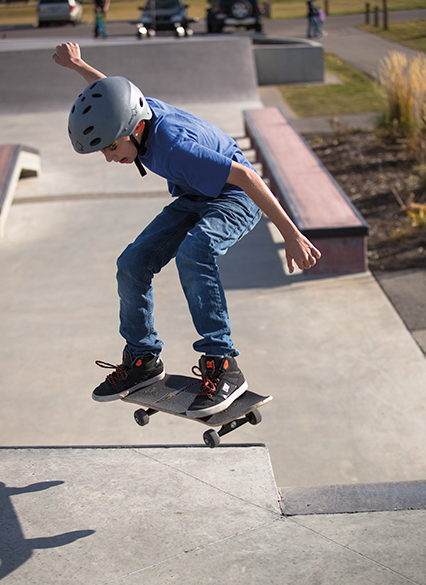Page Content
Grade 8 student Noah Goodwin executes a nose grab during the free skate portion of his school’s skateboarding class on Oct. 21.
Skateboarding course fosters engagement in non-traditional learners
It’s 10:20 on a Wednesday morning. The city of Red Deer is normally quiet at this time of day, as everyone is either at work or at school, but today the air around Glendale Sciences and Technology School is filled with the clattering of skateboard wheels on pavement and the shouts of teenagers having way too much fun for a school day.
The source of the commotion is a group of about 20 helmeted kids who don’t seem at all worried that they should be in school right now — because they already are.
Glendale has offered an optional skateboarding course to its Grade 7 and 8 students since 2013. It’s become one of the school’s most popular classes.
“We are providing the students with an opportunity to exercise their creativity and tap into that creativity in a different way, a way that’s more engaging to them,” said teacher Adam Leonhardt.
The class provides students with an hour of unstructured skate time, during which they are free to develop and hone their skills at their own pace, while also getting active. The curriculum has three units: the history of skateboarding, skateboarding fundamentals and on-board safety, and skate park etiquette.
The idea for the program came when the City of Red Deer announced it would be building a skate park near the school to celebrate the city’s centennial. At the time, Glendale had an after-school skateboarding club, but news of the new park prompted the club’s supervising teacher to take the idea further.
“As soon as I heard that we were getting a skate park right across the field, I thought of it as an opportunity to provide it as an optional class for kids,” said course founder Everett Tetz, a teacher who grew up skateboarding and who is now the vice-principal at nearby Oriole Park Elementary School.
Glendale initially offered the skateboarding course through the phys. ed. curriculum, then got a stand-alone curriculum adopted through the school board, Tetz said. The biggest barrier was safety.
“While [skateboarding] can look really intimidating, studies have shown that the rate of injury is actually quite low relative to some of the other sports or activities being offered in schools,” he said.
It’s not math
Two years after it was first offered, the skateboarding option is consistently full.
“It’s the most fun part of the day. You get to go to the skate park and have fun and not learn stuff like math,” said Grade 7 student Dylan Smith.

Teacher Adam Leonhardt conducts a skateboarding class near Glendale Sciences and Technology School in Red Deer. The optional course has become one of the school’s most popular since being introduced two years ago and enables him to connect with non-traditional learners, Leonhardt says.
Much of the program’s appeal comes from the fact that it’s largely self-directed, Leonhardt said.
“It’s a different style of teaching because you’re just giving them an opportunity to kind of create their own learning. It’s a creative outlet,” he said.
Because the course is unstructured, it attracts students who don’t respond well to more traditional textbook-based teaching, allowing the teacher to connect with students who would otherwise be very difficult to engage.
“It’s amazing to see the level of engagement you can get from some of these kids, and it might turn into the most successful part of their school day,” Tetz explained.
“Those kids who are the hardest to engage become the most engaged,” Leonhardt agreed.
“They may not be the ones who are connecting with the science or the math necessarily but they really do connect with the skateboarding, which has an impact on their whole school day.”

This positive experience can lead to better performance in other subjects such as math and science, he said.
Tetz feels the course has had a positive impact on the school’s overall culture and that its student-led nature is the way of the future.
“We’re looking now at fostering students that think outside of the box. Those were all of the kids that I grew up skating with,” he said.
“For me, incorporating skateboarding into school was really a no-brainer.” ❚
|
No experience necessary
When Red Deer teacher Everett Tetz founded a skateboarding course two years ago, he had years of skateboarding experience behind him. However, current course teacher Adam Leonhardt was relatively new to the sport when he took over the program this year.
While some would assume that Leonhardt’s inexperience would put him at a disadvantage, he said it actually allows him to learn along with his students. Tetz agreed that the skateboarding course doesn’t require a teacher who’s highly skilled in skateboarding.
"It just requires a teacher who is open to trying and open to fostering that growth in the kids," he said.
|
